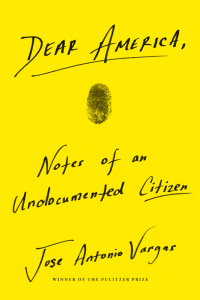Take a photo of a barcode or cover
An accessible, quick read that highlights multiple immigration issues through the lens of one man's life. Vargas' experience in journalism is apparent from the straightforward writing style and the short, easy-to-read chapters. His writing is spare, but has a sense of immediacy to it, and he clearly lays out the hard dilemmas foisted on himself and his family but the United States' screwed up immigration system. I do think that his journalistic background leads Vargas to treat himself with a sense of distance, and as a reader I sometimes felt like I was being held at arm's length. This was especially true in the later sections of the book, where he talks at length about how his identity and life experiences have made it almost impossible for him to experience true intimacy and community with others, without actually exploring what that looks like for him. I also wanted more reflection on how his privilege as a famous reporter with lots of connections has helped him, instead of focusing only on addressing critics of his style of advocacy. Overall though, this is a very illuminating read, and I'm glad my virtual book club chose it as our first read.
challenging
informative
reflective
sad
fast-paced
This autobiography/memoir from Jose Antonio Vargas was an interesting and informative read. While certain parts were quite enjoyable, others were hard to feel emotionally attached to. Vargas does a great job of sketching out his early childhood and some of his formative experiences, but he does not delve too deeply into the relationships he has with his family and mentors, beyond a surface level. His process of learning that he was undocumented and his subsequent career were interesting, but there were some stylistic and writing errors (several distinct instances of phrases being repeated word-for-word, sometimes in the following sentence). The first part of the book had a lot of potential, with Vargas's examination of events that probably are not too easy to remember, as well as his process of coming to understand the United States. Yet again, I would have liked to see him dive deeper into some of these issues of assimilation and homelessness. Vargas seemed evasive in his own memoir, with the latter going into more statistics and numbers on being undocumented (which was certainly interesting and worth knowing).
The vignettes/episodic style of the book did not help the weak narrative links. Though it was mostly chronological, the beginning felt more focused about Vargas's reflections on his life, and the latter became more a fact-dispensing chronology of his career, along with some facts. I appreciated the facts, but it seemed to be a weird tonal shift. I like that the book is trying to portray his experience as an undocumented immigrant, but he even admits that he is good at reporting, less so at writing. The latter half also delved into some criticisms that have been leveled against Vargas, and it seemed to get a bit defensive on his part... I understand again why he showed the reader these events, but it felt a bit out of place. Overall, it was a decent read, but I felt a bit like he was preaching to the choir; those who are seriously anti-immigration are not likely to pick up this book and read the facts, let alone about his life. So I would have liked to get a greater sense of his emotional turmoil. Vargas hints at his isolation and his inability to open up to others -- but does not take the reader deeper than that, as if afraid to disclose too much vulnerability in the book. I understand feeling that way, but in a memoir type book, it left me wanting to know a bit more about him.
I would recommend reading if you are not an immigrant and have taken your citizenship for granted, particularly in the US; or even if you are a foreigner who has no idea how insane the immigration process in the US is, and why there is such a big issue of it. I was sympathetic to Vargas's early childhood, but the overall book did not provide me as strong a connection. I am curious to see Vargas's documentary, White People, because he hints at some of the tensions in the book and it made me curious. The book certainly highlights the incredulously difficulties of being undocumented in the US, and it is a valuable contribution; but as a memoir, a book about Vargas himself, I am not sure it is as reflective as I was anticipating. Being an immigrant, I was able to sympathize with some of his struggles of belonging (especially with his discussions of binary black/white America), but overall I would have liked to hear more from him.
The vignettes/episodic style of the book did not help the weak narrative links. Though it was mostly chronological, the beginning felt more focused about Vargas's reflections on his life, and the latter became more a fact-dispensing chronology of his career, along with some facts. I appreciated the facts, but it seemed to be a weird tonal shift. I like that the book is trying to portray his experience as an undocumented immigrant, but he even admits that he is good at reporting, less so at writing. The latter half also delved into some criticisms that have been leveled against Vargas, and it seemed to get a bit defensive on his part... I understand again why he showed the reader these events, but it felt a bit out of place. Overall, it was a decent read, but I felt a bit like he was preaching to the choir; those who are seriously anti-immigration are not likely to pick up this book and read the facts, let alone about his life. So I would have liked to get a greater sense of his emotional turmoil. Vargas hints at his isolation and his inability to open up to others -- but does not take the reader deeper than that, as if afraid to disclose too much vulnerability in the book. I understand feeling that way, but in a memoir type book, it left me wanting to know a bit more about him.
I would recommend reading if you are not an immigrant and have taken your citizenship for granted, particularly in the US; or even if you are a foreigner who has no idea how insane the immigration process in the US is, and why there is such a big issue of it. I was sympathetic to Vargas's early childhood, but the overall book did not provide me as strong a connection. I am curious to see Vargas's documentary, White People, because he hints at some of the tensions in the book and it made me curious. The book certainly highlights the incredulously difficulties of being undocumented in the US, and it is a valuable contribution; but as a memoir, a book about Vargas himself, I am not sure it is as reflective as I was anticipating. Being an immigrant, I was able to sympathize with some of his struggles of belonging (especially with his discussions of binary black/white America), but overall I would have liked to hear more from him.
emotional
informative
reflective
medium-paced
informative
reflective
medium-paced
informative
inspiring
reflective
This memoir is the true life equivalent of stories told in American Dirt and The Last Story of Mina Lee. Jose’s account of his experience as an undocumented person is eye opening, sad, and inspiring all at once. I appreciate his transparency and activism. He illustrates that the immigration system is operating exactly how it was built—to make the path to citizenship extremely difficult while living, working, paying into a system which does not support or benefit the undocumented folks, and no simple escape. His story doesn’t conclude with solutions, but with some hard truths about where we stand. I recommend this memoir to anyone wondering why and how so many people live and work in the United States undocumented.
4.5 stars. This was a heartfelt and eye opening book, a unique look into one account of an undocumented immigrant. Vargas writes that one of his friends called his level of vulnerability a distant intimacy, and this felt like the truest part of his memoir. Although he writes about intimate parts of his life, his journalist writing style keeps us at a distance, which is right where he wants us. I better understand what it means to live in America in all of her complexities because of this book.
challenging
emotional
informative
inspiring
reflective
medium-paced
“I am here legally, but as a human being, I cannot be illegal because that doesn’t exist. People cannot be illegal.”
Jose Antonio Vargas’ Dear America hits close to home. When I read or hear the word “Filipino”, the first thing that comes to mind is “family”. Dear America displays Vargas’ “radical transparency” and the power of family sacrifice, blood related or not.
The United States of America is the country that Vargas calls home, but it is also the exact same country that doesn’t acknowledge his presence, the country that doesn’t consider him one of its own. He wrote “home should be the place where we feel safe and at peace. Home is not something I should have to earn… It occurred to me that I’d been in an intimate relationship with America, and there was no getting out.”
This book is moving and necessary, allowing me to better understand the immigration process, specifically for the undocumented in the United States.
Jose Antonio Vargas’ Dear America hits close to home. When I read or hear the word “Filipino”, the first thing that comes to mind is “family”. Dear America displays Vargas’ “radical transparency” and the power of family sacrifice, blood related or not.
The United States of America is the country that Vargas calls home, but it is also the exact same country that doesn’t acknowledge his presence, the country that doesn’t consider him one of its own. He wrote “home should be the place where we feel safe and at peace. Home is not something I should have to earn… It occurred to me that I’d been in an intimate relationship with America, and there was no getting out.”
This book is moving and necessary, allowing me to better understand the immigration process, specifically for the undocumented in the United States.




